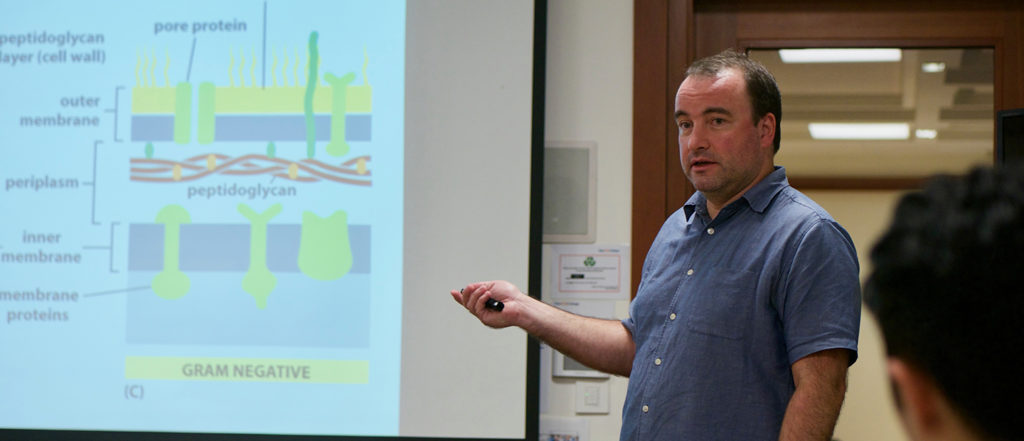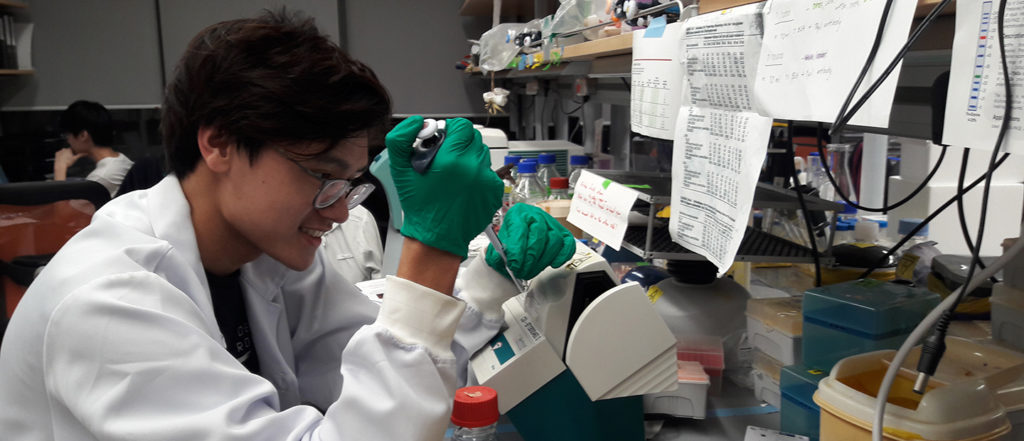Exploring the frontier of scientific research through Genetics and Molecular Cell Biology courses

Students at Yale-NUS College can major in 14 different majors which range from the humanities to the sciences. One of these majors is the Life Sciences major, which explores the mysteries of living things across all scales from the mechanics of protein ‘machines’, to the development of organisms from a single cell, to the splendour and complexity of entire ecosystems.
Among the courses covered in the Life Sciences major are Genetics and Molecular Cell Biology, both taught by Assistant Professor of Science Nicholas Tolwinski.
Describing both classes as complementary, Dr Tolwinski said that one cannot be understood without the other. “Using the analogy of a computer, genetics is basically the “software” while molecular cell biology is the “hardware” and you need both to understand biology,” he shared.
While the Genetics class focuses on fundamental concepts of genetics and how those concepts evolved over time, Molecular Cell Biology examines different aspects of molecular cell biology to understand how biological systems work.
Most classes on these topics are taught by reviewing key discoveries and information in textbooks. However, Dr Tolwinski decided to adopt a more engaging approach by inviting the class to explore the frontier of scientific research in the field and encouraging them to look into what is still unknown.
“Beyond textbook knowledge, I’m interested in showing students what is still unknown and what people are doing to try to figure these things out,” he explained.
Hence, he introduced literature in his classes to engage students on the most current scientific questions. Students take turns to present and share about new publications and journal articles that apply existing knowledge to answer new questions.
One area of application that Dr Tolwinski discusses in his classes is the issue of cancer.
“To understand cancer as a disease, you really need to understand genetics and the combination of factors that cause cells to behave abnormally. When you also understand cell biology, you know what should happen to cells normally as compared to what happens when cancer develops.”
“I can lecture on what we currently know but what I’m also interested in what people are doing about what we do not know yet. It is important to show students that this kind of science is not the kind of science that you can just learn from textbook because it’s so new and constantly changing,” Dr Tolwinski added.
For Grace Kwak (Class of 2020), who is planning to major in Life Sciences, this was something she enjoyed about the Genetics class.
“The key takeaway for me throughout the Genetics course has been its application to real-life situations, such as learning how scientists came up with experiments and discovered what we know now as Genetics, how the different genetics tools and instruments work, and how we can apply that knowledge and skills to current situations,” she shared.
Similarly, Isaac Lee (Class of 2019) shared that the course has introduced him to a diverse range of topics.
“Beyond the nitty-gritty of DNA replication and transcription, the course introduces many interesting topics I’ve enjoyed learning about such as the question of ‘nature versus nurture’, complex genetic phenomena of how diseases can have a genetic basis, as well as an introduction to the study of cancer,” he noted.
Nod Nawat Bunnag (Class of 2019) who had taken both courses, also had the chance to apply his knowledge on cancer through participating in research at the Cancer Science Institute (CSI) Singapore, National University of Singapore, with Dr Alan Prem Kumar, a research colleague of Dr Tolwinski.
 Nod at the Cancer Science Institute (CSI) Singapore. Image provided by Nod.
Nod at the Cancer Science Institute (CSI) Singapore. Image provided by Nod.
“The project that I’m working on involves alternating between the laboratories of Yale-NUS and CSI Singapore.We’re investigating the role of a novel protein in the regulation of a cell signaling pathway. This study is currently being done in both human breast cancer cell lines and fruit flies,” he explained.
“I think of both classes as one big crash course in cancer biology, aiding my understanding of the important principles and paradigms that exist in the field. They provided me with the necessary body of knowledge behind the work that I’m doing, contextualising the problems that arise with cancer, and pointing out some approaches we can take to try and solve those problems.”
Outside of the classroom, Dr Tolwinski’s research focuses on the intra-cellular communication that organises groups of cells into tissues and what goes wrong when cells disregard signals and form cancers. He also previously led a research team exploring the basic mechanisms of cancer and published in several journals, including Developmental Cell, EMBO Journal and PLOS.





